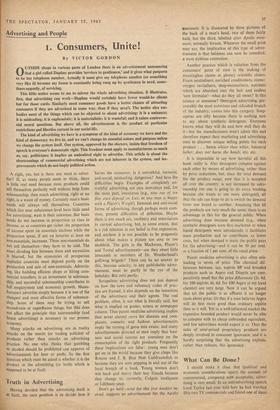Advertising and People I . Consumers, Unite!
By VICTOR GORDON OUTSIDE shops in various parts of London there is an advertisement announcing that a girl called Daphne provides 'services to gentlemen,' and it gives what purports to be her telephone number. Actually it must give my telephone number (or something very like it) because my house is constantly being rung up by gentlemen in need, some- times urgently, of servicing.
This little notice seems to me to mirror the whole advertising situation. It illustrates, first, that advertising can work—Daphne would certainly have fewer would-be clients but for those cards. Similarly most consumer goods have a better chance of attracting customers if they are advertised in some way, than if they aren't. The notice also em- bodies most of the things which can be objected to about advertising: it is a nuisance; it is misleading; it is euphemistic; it is materialistic; it is wasteful; and it raises controver- sial moral questions. But above all, the advertisement is the product of particular restrictions and liberties current in our social life.
The kind of advertising we have is a symptom of the kind of economy we have and the kind of democracy we live in, and we can't change its essential nature and purpose unless we change the system itself. Our system, approved by the electors, insists that freedom of speech is everyone's democratic right. This freedom must apply to manufacturers as much as, say, politicians; it implies an undoubted right to advertise. This article is about the shortcomings of commercial advertising which are not inherent in the system, and im- provements which do not imply political action.
A right, yes, but is there any need to adver- tise? If, as many people seem to think, there is little real need because most products could sell themselves perfectly well without help from salesmanship, then much advertising, right or no right, is a waste of money. Certainly man's basic needs will always sell themselves. Countries which live near subsistence level have little need for advertising; want is their salesman. But basic needs do not increase in proportion to rises in income, so as countries get richer the proportion of income spent on essentials declines while the proportion spent, if not on luxuries at least on non-essentials, increases. These non-essentials do not sell themselves—they have to be sold. The exact dividing line between them and necessities is blurred, but the economies of prosperous Capitalist countries must depend partly on the production and sale of non-essentials. Advertis- ing, like building efficient shops or hiring com- mercial travellers, is' an investment in salesman- ship, and successful salesmanship contributes to full employment and economic growth. Manu- facturers advertise simply because it is one of the cheapest and most effective forms of salesman- ship, Some of them may be trying to sell second-rate or superfluous things, but thht does not affect the principle that salesmanship (and hence advertising) is necessary in our present. economy.
Many attacks on advertising are in reality attacks on the merits (or trading policies) of products rather than attacks on advertising practice. No one who thinks that gambling or alcohol should be prohibited can approve of advertisements for beer or pools. So the first question which must be asked is whether it is the product or the advertising (or both) which is supposed to be at fault.






























 Previous page
Previous page